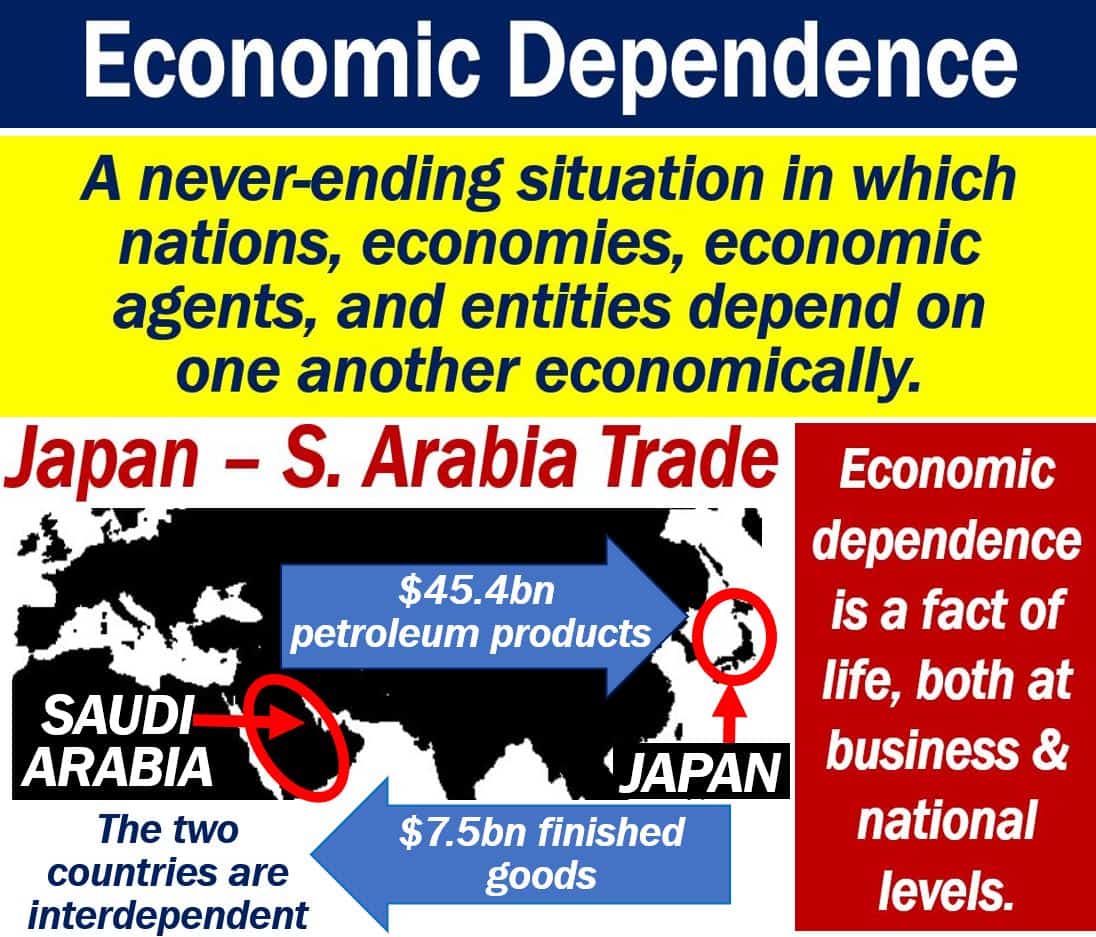Economic dependence refers to the economic dependence of one person, company, country, or entity on another. For one thing or aspect to succeed, another must also succeed, deliver something, or something must happen. There may be no funding for a project if another project is not a financial success. The term may refer to a whole nation, as in “Saudi Arabia’s economic dependence on oil prices is worrying.”
Farmers may lose their crops if it does not rain. Therefore, there is economic dependence on something happening, i.e., rainfall, rather than another entity’s well-being.
Diversification lessens dependence
Companies should not get into situations in which there is economic dependence on one product. That is why they should diversify.
Let’s suppose one product represents eighty percent of your company’s sales. If demand for that product plummets, your company could go down, i.e., die.

Economic dependence is common all over the world. No country on Earth is 100% economically independent. (Import Export Data – Wikipedia)
WiseGeek.com has the following definition of the term:
“Economic dependence is a situation in which the cost or the revenues associated with a given project are dependent on the cost or revenues generated by another project.”
“The concept is found within companies, industries, and even the economies of different countries.”
Economic dependence – costs
In companies, there is a direct relationship between the cost of making something and its sale price.
There is economic dependence between the cost of making something and its retail price. This is because a business aims to make a profit.
Let’s suppose your company produces aluminum cans. Your raw material is aluminum (UK: aluminium). If the price of aluminum rises, you will probably raise the price of your cans. If you don’t raise your price, your profits will decline.
Economic dependence – two companies
Sometimes, one company’s financial well-being depends on the success of another company.
Let’s imagine there are two fictitious companies: 1. ACME Burgers. 2. John Doe Cheese.
ACME is a fast food restaurant chain, while John Doe sells cheese to ACME for its cheeseburgers. In other words, John Doe is ACME’s supplier.
ACME is John Doe’s largest customer. In fact, 75% of John Doe’s sales go to ACME.
A health scandal at ACME does not just affect ACME’s profits, but those of John Doe too. If fewer customers eat at ACME because of the scandal, John Doe’s cheese orders will be lower.
There is a strong economic dependence between John Doe Cheese and ACME Burgers. ACME is also dependent on John Doe. If John Doe fails to deliver cheese, ACME suffers.
Political vs. economic dependence
In political ideology, we think that independence is good and dependence is bad. This is especially the case in countries that were once colonies that fought for their independence.
Unfortunately, politicians use this political notion and promote economic independence too. However, economic and political independence are two very different things.
How economic dependence emerges
Let’s suppose you wanted to purchase lawnmowers and sell them in your store. The cheapest supplier can sell them to you at $35 per item. The next best offer is $50.
Your freedom to choose the $35 option is economic independence.
However, as soon as you choose a supplier, your economic dependence begins. In this case, you become dependent on the cheaper lawnmower supplier.
Let’s suppose that the $50 supplier has a good reputation for delivering top-quality lawnmowers. That supplier also has a reputation for prompt delivery.
However, you still choose to get your lawnmowers from the $30 supplier. You are taking a risk. What if the supplier lets you down or raises prices?
Your $30 supplier’s business choices can potentially affect your business. There is an economic dependence between your business and your supplier’s.
Regarding how economic independence often coincides with economic dependence, Mises.org writes:
“In other words, economic independence – the power to choose among offers – will typically coincide with you becoming dependent, to some degree, on the exchange partner you choose.”
“In this case, you accept the risk that you could be harmed by changes to the original agreement (a willing offer).”
Economic dependence is good for business
The only way to never become economically independent is to make your own lawnmowers. However, you would need to spend a lot of time and money designing and then creating them. You would have to design and create everything in your shop.
Consumers would subsequently have much less choice when coming to your store.
It is not feasible to design and create hundreds of different products yourself. In this sense, economic dependence is a good thing. It allows you to offer consumers a wider range of products, i.e., more choice.
